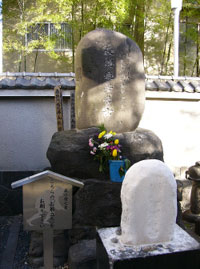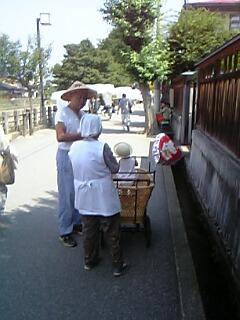
Sunday, March 05, 2000
Monday, January 31, 2000
Posts began 2005. Odds and ends archive follows.
Some of the posts in "2000" are linked to from other pages. I have also archived some deleted or replaced material.
Saturday, January 29, 2000
Dennett
Dennett's lecture partly relied on an analogy between what he called "ideas to die for" and the ant driving parasite. Part of the impact of this comparison was the idea that the parasite was a foreign invader, fundamentally separate from the host ant. The problem when trying to make a comparison between this relationship and the relationship between humans and ideas is that, in an important sense (perhaps the most important sense), humans are made of the ideas that drive us. They are not alien bodies invading us, they are us. Dennett seems to nod to this at another point in the lecture. I don't feel that the parasite is controlling me like an ant, I feel I am a collection of such parasites. It is not that the facts of what Dennett was saying were wrong, it is just that, after a bit of thought, I started to feel that a large part of the lecture's impact came from overstretched analogy between biology and the world of ideas. There seems to be a tradition of "social biology", in which biological science claims to bring deep insights into the study of human relations. Social Darwinism was a very influential manifestation of this. The problem though always seems to be that, in the end, all the biological model is is an analogy. It might prompt a bit of fresh thought, it might even be inspirational, but like all analogies it will not fit properly in some places. No amount of talk of ant driving parasites is going to itself give really valuable detailed insights into the nature of the Catholic Church, just as no amount of study of the Catholic Church will give new information on ant driving parasites. It seems trivially, obviously true that ideas/institutions/ways of thinking exist, just like anything in the world, because they have survived/replicated in the environment in which they have occured. Isn't that kind of obvious? Haven't we always known that? In this case, there is a lot of natural selection going on but there is also a good deal of intelligent design. So the analogy starts to stretch. If you want to get deeper into this you have to study ideas as ideas, not as analogies of biological objects, and that is what history, literature, political studies etc is all about. Presumably the interest in the biology of the ant parasite for the serious biologist is really in the detailed understanding of the interactions of chemicals, strategies etc. etc that allow it to exist and allow it to do what it does, rather than in the bald statements of the parasites existence that we find in Dennett's lecture . The same goes for an institution like the Catholic Church. The political/social analysis in Dennetts lecture was about as insightful as his generalised biology.
Friday, January 28, 2000
RSS
I found the BBC's introduction to RSS very clear on this.
Your feed reader could be a bit like Microsoft Outlook (a downloaded program on your computer) or it could be a feature on your internet browser (Firefox already does this and I think the next version of Internet Explorer will). However, I prefer service called Bloglines because it is web based, so I can access it from anywhere. Google has a similar reader. The simplest introduction to RSS is signing up to a www.my.yahoo.com and sticking a few rss feeds onto your homepage. Although this method means it is difficult to process large numbers of web feeds, it is more like a traditional newspaper in that it feeds news onto a laid out page.
Basically, in all of these programs, you click on a link (or input a url) to an RSS feed and it somehow zaps it into your RSS reader and forever more you have a feed available on your reader monitoring updates to that site. This site, for instance, has a RSS feed here and a Japanese news feed here.
Tuesday, January 18, 2000
Rant picked up
He has a really interesting article about Okinawa's experience in the war.
Update
It was picked up from ikjeld.com by Topix.net, an internet news aggregator. It was the second item in their Japan newsletter (the links don't work):
From: "Topix.Net News Alerts"
Date: August 18, 2005 11:22:11 PM JST
To:
Subject: Topix.net News Alert for Japan
News alerts for Japan (brought to you by Topix.net)
Top Stories (For all articles, visit Topix.net):
Hotel operator Hashiba set to run against Koizumi in poll
MSN-Mainichi Daily News (Thursday August 18, 2005)
Hideyoshi Hashiba, president of a hotel in Goshogawara, Aomori Prefecture, may run in the upcoming House of Representatives election in the Kanagawa Prefecture's No...
http://www.mdn.mainichi-msn.co.jp=2Fnational=2Fnews=2F20050818p2a00m0na019000c.html
War Guilt
IKjeld.com (Thursday August 18, 2005)
There was a fascinating account on Japan's Kyodo newswire at the end
of last week of a visit by a group of British school children to Japan
to commemorate the end of the war.
http://www.ikjeld.com=2Fjapannews=2F00000216.php
Tokyo Electric Says Some Radioactive Water Leaked At Reactors After
Quake
Bloomberg (Thursday August 18, 2005)
Tokyo Electric Power Co., Asia's biggest power producer, said some
radioactive water spilled from storage pools into ventilation systems
of three nuclear reactors because of an earthquake that shook Japan
two ...
http://www.bloomberg.com=2Fapps=2Fnews=3Fpid=3D10001099=26sid=3Da
BlIuqJwyewE=26refer=3Denergy
Briefing - Asia Health - Aug 18, 2005
Asia Pulse via Yahoo (Thursday August 18, 2005)
An executive briefing on Health for Aug 18, 2005, prepared by Asia
Pulse , the real-time, Asia-based wire with exclusive news, commercial
intelligence and business opportunities.
http://Fsg.biz.yahoo.com=2F050818=2F16=2F3ubxh.html
The Korea Herald : The Nation's No.1 English Newspaper
Korea Herald (Thursday August 18, 2005)
My father and four of my uncles fought in the Pacific campaign against
the Japanese.
http://www.koreaherald.co.kr=2FSITE=2Fdata=2Fhtml_dir=2F2005=2F08
=2F19=2F200508190007.asp
For all the articles on Japan please visit topix.net
http://www.topix.net/world/japan/
Sunday, January 16, 2000
Thursday, January 13, 2000
Barack Obama Against Going to War with Iraq, Oct. 26, 2002
Speech by Barack Obama
Delivered Oct. 26, 2002
(Linked from this main Buyo post. The date on the top of this post is misleading. I just filed it in 2000 to keep it out of the mainstream of the blog)
I stand before you as someone who is not opposed to war in all circumstances. The Civil War was one of the bloodiest in history, and yet it was only through the crucible of the sword, the sacrifice of multitudes, that we could begin to perfect this union and drive the scourge of slavery from our soil.
I don't oppose all wars. My grandfather signed up for a war the day after Pearl Harbor was bombed, fought in Patton's army. He fought in the name of a larger freedom, part of that arsenal of democracy that triumphed over evil.
I don't oppose all wars. After September 11, after witnessing the carnage and destruction, the dust and the tears, I supported this administration's pledge to hunt down and root out those who would slaughter innocents in the name of intolerance, and I would willingly take up arms myself to prevent such tragedy from happening again.
I don't oppose all wars. What I am opposed to is a dumb war. What I am opposed to is a rash war. What I am opposed to is the cynical attempt by Richard Perle and Paul Wolfowitz and other armchair, weekend warriors in this administration to shove their own ideological agendas down our throats, irrespective of the costs in lives lost and in hardships borne. What I am opposed to is the attempt by political hacks like Karl Rove to distract us from a rise in the uninsured, a rise in the poverty rate, a drop in the median income, to distract us from corporate scandals and a stock market that has just gone through the worst month since the Great Depression.
That's what I'm opposed to. A dumb war. A rash war. A war based not on reason but on passion, not on principle but on politics.
Now let me be clear: I suffer no illusions about Saddam Hussein. He is a brutal man. A ruthless man. A man who butchers his own people to secure his own power.... The world, and the Iraqi people, would be better off without him. But I also know that Saddam poses no imminent and direct threat to the United States, or to his neighbors...and that in concert with the international community he can be contained until, in the way of all petty dictators, he falls away into the dustbin of history.
I know that even a successful war against Iraq will require a U.S. occupation of undetermined length, at undetermined cost, with undetermined consequences. I know that an invasion of Iraq without a clear rationale and without strong international support will only fan the flames of the Middle East, and encourage the worst, rather than best, impulses of the Arab world, and strengthen the recruitment arm of al-Qaeda.
I am not opposed to all wars. I'm opposed to dumb wars. So for those of us who seek a more just and secure world for our children, let us send a clear message to the president.
You want a fight, President Bush? Let's finish the fight with Bin Laden and al-Qaeda, through effective, coordinated intelligence, and a shutting down of the financial networks that support terrorism, and a homeland security program that involves more than color-coded warnings.
You want a fight, President Bush? Let's fight to make sure that...we vigorously enforce a nonproliferation treaty, and that former enemies and current allies like Russia safeguard and ultimately eliminate their stores of nuclear material, and that nations like Pakistan and India never use the terrible weapons already in their possession, and that the arms merchants in our own country stop feeding the countless wars that rage across the globe.
You want a fight, President Bush? Let's fight to make sure our so-called allies in the Middle East, the Saudis and the Egyptians, stop oppressing their own people, and suppressing dissent, and tolerating corruption and inequality, and mismanaging their economies so that their youth grow up without education, without prospects, without hope, the ready recruits of terrorist cells.
You want a fight, President Bush? Let's fight to wean ourselves off Middle East oil through an energy policy that doesn't simply serve the interests of Exxon and Mobil.
Those are the battles that we need to fight. Those are the battles that we willingly join. The battles against ignorance and intolerance. Corruption and greed. Poverty and despair.
Monday, January 10, 2000
Izutsu
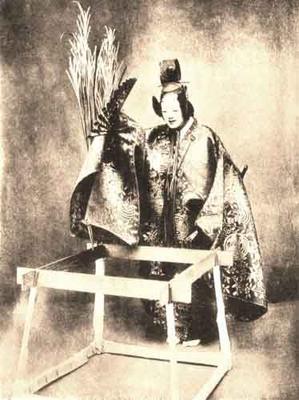
Izutsu (or "The Well Side) was written by Zeami, the dominant figure in the early history of Noh. It is one of the classics in the Noh canon.
Izutsu is based on an old story from the Ise Monogatari, a 9th century collection of stories, many of which are based on stories about the romantic encounters of a "certain man", traditionally identified as the poet Ariwara no Narihira.
Zeami's play starts with a priest arriving at a ruined aristocratic house. A village women arrives to tend the graveyard in the house and, as he watches her, the priest becomes intrigued. He asks her why she is tending the grave and she says there is a story behind the place. She begins to tell the story from the Ise Monogatari:
A man and a woman knew each other from early childhood. They were good friends, competing against each other to see who was taller by measuring each other against the local well. As they grew older, they began to feel more self-conscious in each other company and drifted apart.When she has finished the story, the village woman looks at the priest and says she is the wife in the old 9th century story. She disappears. He has seen her ghost. The priests asks a village man about the place and hears the same story again. The villager suggests that, as a priest, he could offer a prayer to her soul and the priests decides to sleep at the ruined mansion. She comes to him again in a dream. This time she is wearing her husband's clothes. She dances and sings about how much she loves her husband and how much she yearns for him. She looks into the well that they had stood beside as children and sees his reflection. She then disappears.
The boy eventually realises how beautiful his childhood friend has grown and composes a poem saying only that he has grown tall while he hasn't seen her. She replies that her girlish hair has grown past her shoulders :"If not you, who'll do it up for me?"
They get married. The man later falls in love with another woman and takes to making visits to this woman's house. One stormy night, as he is leaving the marital home on one of these visits, he notices his wife, without knowing that he is looking, compose a poem saying that she is worried about his welfare on a journey on such a stormy night. It brings home to him how much he is loved and he does not go to the other woman. He never goes back.
I am no expert on Noh drama and I warn that may have got details of this story wrong but this final image in the drama seemed extraordinary. On stage, the audience at Kamakura's Takigi Noh saw a man wearing a Noh mask representing the dead soul of a woman appearing in the dream of another. She was dressed in man's clothing, and looked into the well and saw in the water, not her own face but, the mask of the man she loved beyond death. It is very multi-layered and yet, in the context of the play, strikes the viewer as such a simple expression of love.
Here is a translated text of Izutsu.
Sunday, January 09, 2000
This may make you choke on your sushi...
Does one of the host nations of the World Cup bring to mind geishas and duty-bound businessmen? Cut the cliché, says Ayako Yoshino.
The world's greatest sporting carnival has kicked off again. Brace yourselves for a flood of goals and a torrent of cliche. Even now, the television commentators are practising their "German efficiencies", juggling their "Brazilian flairs", and drilling their "Nigerian athleticisms".
Of course, the host countries can expect their fair share of stereotyping, and Japan, where England play all of their group matches, will be the focus of particularly loving attention from the British media. It would be a wonderful opportunity to correct some stereotypes, but if past media coverage can be taken as a guide, it is probably not too pessimistic to expect numerous beautiful images of Kyoto's Golden Pavilion and Mount Fuji set against disappointingly shallow chatter about a group-oriented, homogeneous, hierarchical and highly technological society governed by concepts of shame, duty and discipline. If we are really lucky, we might even get the odd reference to "traditionally submissive Japanese women".
There will be nothing new in that. Casual stereotyping of Japan has long been a staple of the British media. It may come as a surprise to some, but the bizarre gameshow Endurance has probably been more widely disseminated in this country through Clive James's programmes than it ever was in Japan, where it was about as mainstream as topless darts was in Britain. The 1980s song "Turning Japanese" - already a fixture in the World Cup build-up - sounds puzzlingly Chinese to the Japanese ear.
But what is the real story? Ron Atkinson and Terry Venables might not notice it, but English football is visiting a country that is in the midst of the most fundamental changes not only to its economy and politics, which have been rocked since the collapse of the "bubble" stock markets of the 1980s, but to its basic ideas of itself. A new breed of Japanese academics is presenting an unsettling self-portrait to the nation, and the first targets to be attacked have been postwar theorists who described the country as having a uniquely homogeneous and group-oriented culture.
Kosaku Yoshino, associate professor of sociology at Tokyo University and author of Cultural Nationalism in Contemporary Japan , has made a study of "Nihonjinron", theories of Japanese distinctiveness, which he says became popular in postwar Japan after the traumatic experiences of devastating military defeat, vicious self-recrimination by Japanese in the immediate postwar years, rapid and enforced Americanisation, and subsequent breakneck economic growth. These theories, which often emanated from mainstream academics and were massively popular in the 1970s and 1980s, could border on the absurd: the idea that Japan's rice-growing tradition meant that the Japanese were uniquely family-oriented compared with the West's "wheat-growers", as Eiichiro Ishida argued in 1969, or the apparently contradictory proposition that the West's "hunting traditions" made for a highly analytical mode of communication as opposed to the Japanese rice-grower's emphasis on "feelings of consideration, gratitude, encouragement and sympathy, which are unnecessary for hunting", as Yuji Aida stated in 1972. There is also the rather unsettling case of The Japanese and the Jews , the bestselling book of all genres in 1970, contrasting the nomadic self-oriented Jews with the cooperative Japanese. Its author, Isaiah BenDasan, claimed to be Jewish but is widely thought to have been a well-known Japanese social critic.
"The first thing to understand about these ideas is that they go well beyond the facts. They are a faith system, which had more to do with delineating what it meant to be Japanese so it was safe for the country to absorb foreign cultural elements. Nihonjinron was an attempt to define a supposedly homogeneous Japan against an imagined homogeneous West," Yoshino explains. Many of these theories were exclusively concerned with a binary, oppositional relationship with the West, often feeding off mistaken western theorising about Japan and excluding the exploration of relationships and ties with other cultures. Japan was therefore seen as unique.
Of course, the reality never quite fitted these imaginings. Yoshino points out that, while Nihonjinron theorists celebrated Japan's "classless" society, hundreds of strikes were reported every year. Japan is also more ethnically diverse than is widely understood. The average British traveller will find it difficult to distinguish Japan's main ethnic groups, but figures in 1998 showed that there were about 640,000 Koreans in the country, 260,000 Chinese and about the same number of Brazilians, of whom large numbers were Japanese-Brazilians. There were also hundreds of thousands of Peruvians, Filipinos, Thais, Indians, Middle East nationals and westerners. Although foreigners make up a relatively small 1.2 per cent of the Japanese population, some communities found themselves with up to 14 per cent of non-Japanese inhabitants by the mid-1980s.
Many of these groups are becoming increasingly assertive. Physical differences are impossible to determine, even for the Japanese, but ethnic Koreans are now rapidly taking up their original names and rebuilding their own cultural identity. There are 86 Korean schools and colleges in the country. Japan's two main minority groups with Japanese nationality - the Ainu and Okinawans - are showing a similar resurgence.
And it is not just ethnic minorities who are challenging received ideas of Japanese homogeneousness. Japan's leading feminist, Tokyo University professor Chizuko Ueno, says: "Nationalism and sexism often go hand in hand because women are often, in fast-changing societies, made to represent culture and tradition. While men quickly adopt western suits, women are often made to remain in the traditional clothes. That's why some reactionaries attack Japanese women as the very people who destroy Japanese tradition."
It would be a major surprise if this summer's World Cup coverage did not feature a good number of that highly endangered species, the geisha. But while white-faced, tightly bound girls may remain a predominant image of Japanese womanhood abroad, Ueno's data paints a radically different picture.
The figures show that housewives are now in a minority in Japan. She says:
"Japan now has one of the lowest birthrates in the developed world, and the reason for that is simply because so many Japanese women choose not to get married. It is so visible. Even if they get married, they tend to do so at much later age than they used to. Sexual liberation has happened in Japan as well. At the moment, 25 per cent of the first-born of newlyweds are conceived before marriage. Long past are the days that being single meant no sex life. Submissive and chaste Japanese women no longer exist or, more precisely, they never really existed."
Falling birthrates combined with economic depression have meant a major restructuring for Japan's university sector. While this has generally been characterised by a shift from non-vocational to vocational education, with subjects such as law and information technology prospering at the expense of humanities subjects, the shake-up has also directed new interest at traditionally neglected areas such as gender and applied social sciences. Even in a bastion of an old academic order such as Japanese history, Yoshihiko Amino, a medieval specialist, has detected a new wind blowing. Early this year, a major academic publisher began publishing a series of studies of the history and politics of the Japanese emperor system. "The very idea of the publication of such works would have been inconceivable in the past," says Amino, who became one of Japan's most controversial academics by confronting many of the assumptions of Nihonjinron and describing medieval Japan as having diverse cultures and modes of production.
Fresh thinking has not been confined to ivory towers. Amino's work provided inspiration to the makers of Princess Mononoke , a 1997 historical fantasy that became Japan's highest grossing domestic film. NHK, Japan's more stern equivalent of the BBC, last year broadcast a television drama series set in Okinawa, emphasising that island's distinctive culture. But more momentous was a primetime documentary in the same year dealing with the roots of the Japanese people and blowing apart ideas of their racial and cultural homogeneousness. Millions of viewers of Japanese: Long Journey were treated to an account of a country with racial origins in numerous farming and hunter-gathering groups across Siberia, Malaysia, Indonesia, China and Korea, an account not dissimilar to the established view of Britain's varied racial and cultural heritage. The effect of this kind of fresh thinking has been profound, Yoshino says: "It is no longer rare to hear the Japanese referring to themselves as a mongrel nation."
Not all debate in Japan in recent years has been along such progressive lines. Reactionary nationalism has prospered among some parts of the population during the economic depression of the past decade. The present prime minister, Junichiro Koizumi, has sometimes pandered to such sentiment, and Tokyo's highly nationalistic governor, Shintaro Ishihara, has made a political career out of attacking foreigners. However, whatever some older Japanese people might tell you, one thing that Japan is certainly not at the moment is a uniquely "homogeneous" or "harmonious" society.
Ayako Yoshino is taking a PhD on cultural nationalism in Edwardian England at Girton College, Cambridge.
This article was published in the Times Higher Education Supplement, 31 May 2002
Thursday, January 06, 2000
Nyukawa


Pete, you were of course right. Kiyomi and Nyukawa are on opposite sides of Takayama. We came in and left through Nyukawa, which I think was part of your fiefdom. These are a couple of really rubbish pics taken from a moving car as we left town. Not sure I really capture the beauty of the place.
Wednesday, January 05, 2000
Freedom for whom?
George Monbiot
Published: 11 February 2005
Your article "What's a nice Trot doing in a place like this?"
(January 28) accuses me of peddling conspiracy theories about Frank Furedi and other former members of the Revolutionary Communist Party. But I don't have a theory. I've reported a number of phenomena and then asked what is happening and why. This, if I'm not mistaken, is what journalists are supposed to do.
Some of these phenomena should be of interest to your readers.
Former RCP members control much of the formal infrastructure of public communication used by the science and medical establishment. They hold key positions in Sense About Science, the Science Media Centre, the Genetic Interest Group, the Progress Educational Trust, Genepool and the British Pregnancy Advisory Service. They have used these positions to promote the interests of pharmaceutical and biotech companies and to dismiss the concerns of the public and non-governmental organisations.
Given that the RCP was a tiny splinter of a Trotskyist subgroup, with just a handful of disciples, given that most of the people who have taken these posts do not have a background in science, and given that the movement has a long history of entryism, its former members' colonisation of these bodies is unlikely to have happened by chance.
The article was billed as a piece about "academic freedom". The implication appears to be that academics should be free from public criticism or investigation. Is this really the position of The Times Higher? If so, is there not a conflict between academic freedom and the freedom of the press?
George Monbiot
Oxford
What's a nice Trot doing in a place like this?
Chris Bunting
Published: 28 January 2005
Everyone loves a conspiracy, and the tale of Frank Furedi and his gang of "Trotskyists-turned-media-friendly Tory extremists" is one of the best. Over the past seven years, a group of journalists and researchers, working mainly for The Guardian, The Observer, the New Statesman and websites such as Disinfopedia, have uncovered a world of intrigue and subterfuge surrounding the University of Kent professor of sociology.
It seems that the apparently mild-mannered Furedi led a previous existence as Frank Richards, the ideologue of the famously weird Revolutionary Communist Party, an organisation despised even on the far Left for its oddball policies and aggressive tactics during its Eighties heyday, including trying to disrupt the miners' strike and violent assaults on members of opposing factions.
The organisation wound up in the late Nineties, but what alarmed Guardian columnist George Monbiot and other writers was evidence that members of its former leadership had since disguised themselves as respectable academic and media commentators and "taken on key roles in the formal infrastructure of public communication".
Starting with the setting-up of Living Marxism magazine in the late Eighties, followed by its successor LM (closed due to a libel action by ITN against its reporting of the Bosnian conflict) and finally with the online magazine Spiked and its sister thinktank the Institute of Ideas, the former RCP had wormed its way into polite debate, the theory went.
Its politics, according to Monbiot, had undergone an extraordinary transformation from "the most distant fringes of the Left to the extremities of the pro-corporate libertarian Right". Its members championed genetically modified foods, global warming and freedom for multinationals.
There was also worrying evidence that it had retained its fondness for conspiratorial politics.
Monbiot and other RCP watchers traced a "cultish" network of Furedi acolytes occupying influential positions in the establishment. Phil Mullan, a former RCP activist, was, said Monbiot, the director of publishing house Global Futures, which shared a telephone number with the respectable Association for Sense about Science. Both the director and assistant director of SAS, Tracey Brown and Ellen Raphael, had studied under Furedi at Kent and had worked at the same PR firm, where they represented some big corporations. Brown had written for LM and published a booklet with the Institute of Ideas.
The list went on. Organisations blacklisted by Monbiot as having employed LM-Spiked contributors in senior positions included the Science Media Centre, the Genetic Interest Group and the British Pregnancy Advisory Service, run by Furedi's partner, Ann. More worrying, RCP members seemed to have had astonishing success in the mainstream media: Mick Hume had a column in The Times, Claire Fox was a regular on Radio 4's The Moral Maze, and, since Monbiot's article, Furedi has become a columnist for The Times Higher.
Was this all a coincidence or was there some design to it, Monbiot asked. Despite writing about Furedi's "sect" over seven years, Monbiot has never given Furedi a chance to respond to his accusations. This has led to what Furedi claims are a number of inaccuracies and the impression of a scheming group of individuals devoted to concealing their Trotskyist history while infiltrating polite society. It is disconcerting, then, to find Furedi talking energetically about his RCP past barely five minutes into an interview with him at his home in Faversham, Kent. It is difficult to get him off the subject. Claire Fox, head of the Institute of Ideas, says, when organising an interview: "First, we'll go through the whole RCP thing, my supposedly sordid past, but hopefully we'll get on to what I'm doing now."
Furedi says he has been dogged by last year's Monbiot article in particular: "Copies of this article have been sent to my vice-chancellor.
Letters are sent questioning why they are employing such a person. Last summer I was doing a lecture tour in the US. All of a sudden people in Phoenix, Arizona, were coming up to me with copies of Monbiot's article asking me what I was up to.
"It is so fascistic. It is McCarthyism: writing to people trying to get you fired from your job because of some plot you are supposed to be involved in. It is completely fair to call me a schmuck, but these people are not debating. They are saying I should not be listened to because I am a conspirator... That kind of conspiracy theory, historically, used to be an argument of the Right. It was characteristic of the Right to talk about masonic conspiracy, about Jewish plots, but now we are seeing parts of the Left being obsessed with this kind of stuff," Furedi says.
The standards of proof used by some former RCP watchers to establish a conspiracy appear to be low. Fox argues that almost any organisation could be convicted on a similar charge. "What they are saying is that if you have had any connection with the RCP and you have since got on with your life, then whoever you work for now is a front organisation for the RCP, which doesn't even exist. Certainly, there is a network of like-minded people.
Some people do come from an RCP background, because we have a long intellectual history together, and we do work together sometimes, but it is just wrong to imagine that there is some revolutionary cell."
So why, asks Laurie Taylor, Times Higher columnist and visiting professor of politics and sociology at Birkbeck College, London, do all these former Trotskyists agree in detail on what appears to be in essence a right-wing platform and how can they call themselves academics if they appear to deny independent thought? You might have expected them to travel in a variety of directions after the collapse of their revolutionary dream in the Nineties, but many peddle similar lines.
This is often characterised by the group as "a defence of enlightenment values". In practice, it means intolerance of what it sees as a lack of faith in science and has led to strident campaigns in favour of GM experimentation and human cloning. A second libertarian theme confirms the impression of a radical right-wing agenda, justifying defence of fox hunting and attacks on gun control. How could a group of Trots travel such a distance ideologically without some organisation?
For the answer, says David Webb, a former RCP supporter who has grown estranged from its politics, we must understand the nature of party in its heyday. "The RCP always discussed everything into the ground. If you wanted to become a supporter, you were expected to study certain books - they were your 'Part One'. There were seminars with only three or four people and you had to read the books. The questions asked in the seminar were such that if you hadn't read them you would be at sea.
"Outsiders often talk about it being cultish, but it wasn't cultish at all.
You were allowed to disagree with what the line was. They were just so confident in their theoretical knowledge that they were confident that they could convince you," he says.
Many of the positions taken by the RCP in the Eighties and Nineties, Webb says, are consistent with the positions now taken by Furedi and his friends. He says the party was "against political correctness from the start" and there was always a strong belief in the progressive power of science. The Institute of Ideas' interest in inviting influential people from across the political spectrum to its debates, seen by some as an attempt to infiltrate the establishment, is interpreted by Webb as a continuation of the RCP's often derided commitment to free public debate and expression. Monbiot, for example, accuses the RCP of trying to undermine the miners' strike on the basis of the party's insistence that the miners be balloted.
Furedi certainly doesn't play the role of Marxist conspirator any more.
Asked if he still considers himself a revolutionary, he sighs, saying that before he felt he knew where society was going, but now he is not so sure.
"I pick up the stimulus for some of my best ideas from all kinds of schools of thought at the moment. I often regret that there were certain books I didn't read earlier because I was narrow - Hannah Arendt, Christopher Lasch, Kant. I am struggling in the dark, but I do know we need debate."
Tuesday, January 04, 2000
An underpass

The underpass on the wayfrom my old house to thestation. For some reason, this was a particularly nostalgia drenched spot. Perhaps because I used to have to bike through here every morning at breakneck speed in a desperate attempt to catch a hopelessly missed bus to one of my schools in the mountains. Also remember meandering through here on Fridays on my way out of town. Can't believe I spent most of my first year leaving this wonderful place for a real dive three hours South. Young love!
My old house

Met the current residentat H.'s bar. It is stilla JET scheme apartment. He was a nice chap.
Sunday, January 02, 2000
Manga
Unlike the US comic industry, Manga was never effectively censored. Its US counterpart was the subject of a moral panic in the mid-1950s and neutered itself by introducing self-regulation banning the "portrayal of sex, violence, and antisocial activity" (1954, US Comics Code Authority) in comic books. The number of comic titles immediately dropped by 50 per cent and the industry never fully recovered. It had effectively limited itself to a non-adult audience.
Meanwhile, manga thrived. Its presiding genius from the 1940s onwards was Osamu Tezuka.
The manga market now accounts for about a quarter of all magazine and book sales in Japan, reaching readers of all ages. Circulations for manga magazines can be huge. Shounen Janpu has a weekly circulation of 5-6 million (for reference, Time magazine sells about 4 million). Manga books also sell in massive numbers. They often have first print runs in excess of 2 million ("best-seller" status in the non-manga book business is earned by selling more than 100,000 books). Some of the best selling publications in history have been manga.
For more info: Wikipedia manga entry
Saturday, January 01, 2000
A little fictional game
PS. ON SECOND THOUGHTS I THINK I MAY LEAVE THIS LITTLE GAME ON THE SHELF FOR NOW. I HAVE PLENTY OF REAL WORK TO DO AND THIS WAS HIGHLY LIKELY TO HAVE WORKED AS A GOOD EXCUSE NOT TO GET ON WITH IT. THE IDEA WAS TO HAVE HAD AN INITIAL CORRESPONDENCE BASED ON THE SCAM APPROACH. A FAILURE OF THE SCAM APPROACH BECAUSE OF THE RECTITUDE AND FINANCIAL INNOCENCE OF MRS BLAKE, IN WHICH TIME MRS BLAKE WOULD HAVE SHARED REAL PERSONAL HISTORY THAT IN SOME WAY PULLS ON THE SCAMMER. THE ATTEMPTED WITHDRAWAL OF THE SCAMMER. A CRISIS IN WHICH MRS BLAKE IS TOLD BY HER SON THAT IT IS A SCAM. A POST SCAM CORRESPONDENCE IN WHICH THEY SHARE THE REALITIES OF THEIR LIVES, AND WE BEGIN TO UNDERSTAND THE DIFFICULTY AND BRUTALITY OF THE LIFE OF THE SCAMMER, AND PERHAPS A MEETING AFTER MANY YEARS. ANYWAY, THE GAME IS ON THE SHELF AND I CAN STOP WRITING DESPERATELY IN CAPITALS.
The Nigerian Letter
Greetings to you, with warm heart I offer my friendship and heartfelt regards. I hope this mail greets you in good time. We have not met personally or had any dealings so this contact may seem odd or surprising to you but I humbly ask that you give due consideration to my important proposal and the benefit it may be to both of us.
I duly deeply apologize for trangressing on your private time, and if this contact is not acceptable to you I apologise more sincerely. I propose to you as one gentleman of integrity and reputation to another of reputation a most serious scheme.
First, I believe it is appropriate to introduce myself formally to you. My name is Dr Charles Chamoun, a close friend and confidant of the late and dearly loved Pierre Amine Gemayel, the Christian leader who was assasinated by three to four gunmen opened fired at close range on my good friend with five different types of silenced automatic weapons, all using 9 mm bullets, after ramming his car from the front in the Jdeideh suburb of Beirut with a Honda CRV with tinted windows that they were driving on Tuesday 21 november 2006. My friend was being driving in his car by his driver,when the gun men attacked and gunned him down.
Before my boss was finally assasinated he entrusted a large number of monies in my trusted care, which was only known by myself and him for the preparation of the next election which was kept with a secret security firm at the neighbouring district of Jordan for safe keeping. He allowed one of his friends in the person of Mr. Gibril Martins as the the depositor and an foreign business associate was declared the beneficiary of the deposited consignment. The safety deposit, which is a treasured family heirloom, is stocked full with hard money.
I have decided to have this fund invested immediately in commercial and lucrative residential properties in foreign lands as well as various other profitable ventures that I as his close friend have in mind for the good of our cause, but have certain problems in leaving my country of current residence because of the current volatile and uncertain state in the world. We don't know what is going on and I am therefore hopeful that you propose to render me your most needed assistance in this regard.
If you agree to lend me your trusted hand, side by side with me in this most important endeavour, your role will be to act on my behalf as a trustee to our enterprise and to receive the safety deposit containing the funds from the Security firm. Though I believe this transaction will be based on friendship and trust, I will offer you 2% of the funds as a token of Mr Geymayel's great gratitude and 7% for any the expenses that may pop up in the course of this transaction both here and from your end. I thank you in advance for your stalwart support to our great enterprise and I look forward to a long lasting friendship relationship with you.
As you will obviously know and understand, due to alien monitoring of the respected leadership of our small country, even far beyond our borders, it is not safe to communicate with me via phone on this most secret of matters. For this very same reason I have fled to Africa from my beloved home country, leaving no trace of my person because I was cowardly attacked by some unknown gun men in a Honda CRV with tinted after that infamous incident of my friend and companion. I lost everything but my hope in fellow humanity like yourself. Whether or not you are interested in assisting our endeavour, be kind and tell me your beliefs on these important matters, as this will enable me make alternative plans in the event of a non-interest from you, my friend.
Yours Sincerely,
Mr. Charles Chamoun.
---
The Stump,
Woodlands Drive,
Walton on Thames,
Surrey,
KT12 IBE.
Dear Dr. Chamoun,
Thank you for your letter. I was very sad to read about Mr Gemayal. I had seen his death in the newspapers over here. My husband Clive was actually stationed in Palestine after the war. That was before we were married but I always look out for the Middle East news. Too often it seems to be very sad. I am sure I can`t imagine how difficult your lives are.
I must confesss your letter did strike me as a little out of the ordinary but then I have never lived in the thick of events as you do. I should put you right on one point, however. You seem to be under the impression that I am a man. You are not the first. Frances sometimes puts people on the wrong track. It is Mrs Frances Blake. I am not sure why you decided of me for the banking matter. I don`t think I am really your person for that sort of thing. As I say, I have the greatest of sympathy for Mr Gemayal`s supporters. I actually proposed to the vicar at the time that we should mention it in our service, as fellow Christians, but the Rev. White wanted to talk about "fair trade". It is a great enthusiasm of his. Any help I can give, please ask, but, as I say, I am sure you would be better to engage a professional on the bank transaction.
I have used your "Dr.", although you seem to have dropped it when signing off. Are you a medical doctor? My son Graham obtained a doctorate at Loughborough in Aeronautical Engineering but he doesn`t use the "Dr." except at work. You were lucky to catch me with your "email". I don`t really like to use it but Graham was sending me something to do with a remittance, so I was looking at it today. Thank you again for your most interesting letter. I will look at my "email" for your reply.
Yours,
Frances Blake
(Originally posted on 08/03/07 and moved here because obstructing the front page)
36 views of Mount Fuji by Hokusai Katsushika
(For slightly bigger images click the pics.)

From Nihonbashi in Edo

From Hoinganji Temple at Asakusa

From Suragdaji in Edo

From Tsukadajima in Musashi

From Surugacho in Edo

From Senju in Musashi

A Mill at Onde
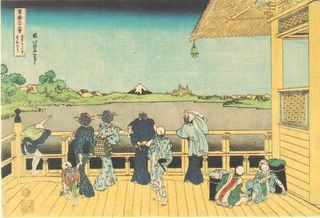
From Gohyaku Rakon Temple

A Morning after Snow in Koishikawa
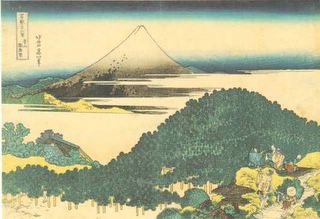
At Enza-no-matsu Pine at Aoyama
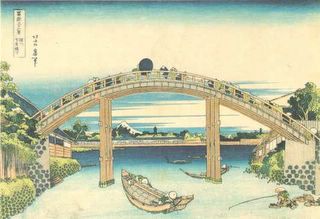
View through Mannen-boshi at Fukegawa
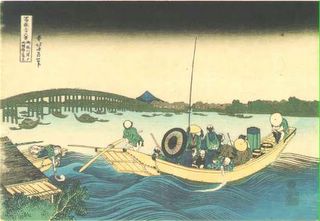
Sunset view across Ryogoku Bridge from the bank of the Sumida in Oumayagashi
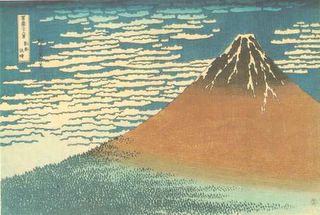
View on a fine breezy day
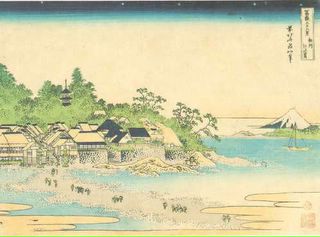
From Enoshima in Sagami

FromTago Beach in Ejiri on the Tokaido Road

From the Tama River in Musashi
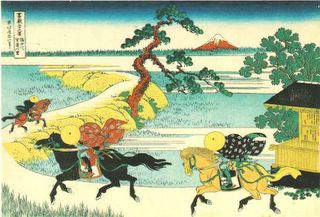
From Sekiya by the Sumida river

From Shimo Meguro
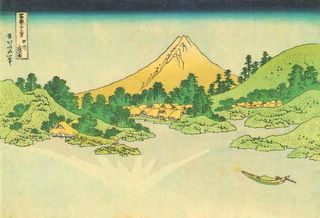
From Misaka in Kai province

From Ejiri in Suruga

From Kajikazawa in Kai

From Mishima Pass in Kai
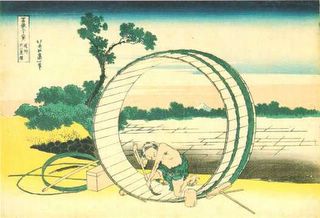
From Fujimigahara in Owari
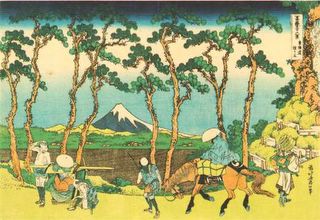
From Hodogaya on the Tokaido road
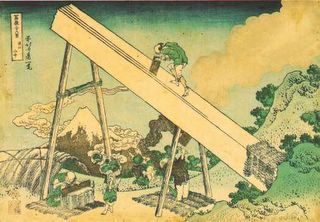
In the Mountains of Totomi
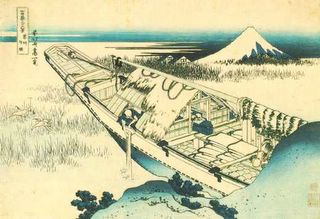
From Ushibori in Hitachi

From Yoshida on the Tokaido road

From the sea off Kazusa
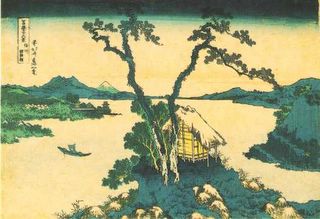
From Lake Suwa in Shinano
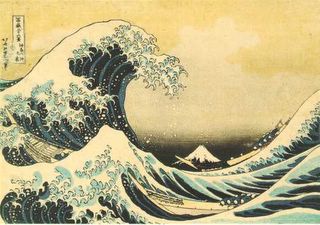
Waves off the coast of Kanagawa
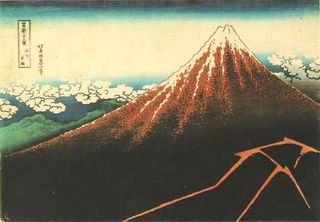
Summer shower beneath the peak

From Noborito
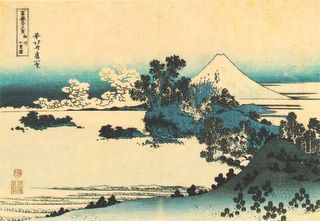
From Shichirigahama Beach in Sagami

From Inume Pass in Kai

From the lake at Hakone in Sagami
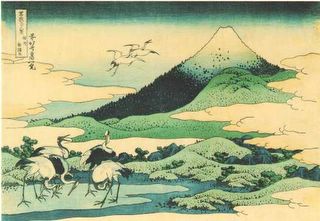
From Umesawa in Sagami
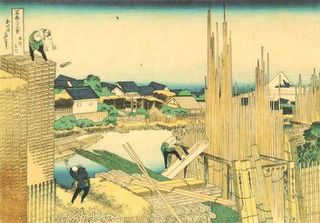
From Tatekawa in Honjo
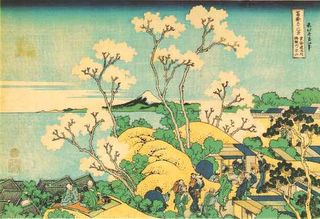
From Gotenyama at Shinagawa on the Tokaido road
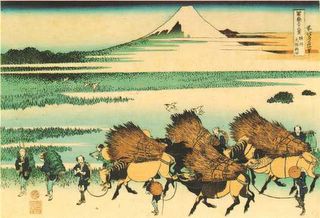
From Ono Shinden in Suruga
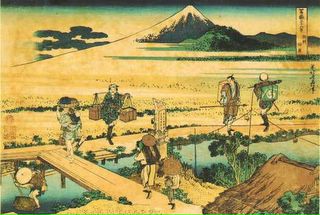
From Nakahara in Sagami
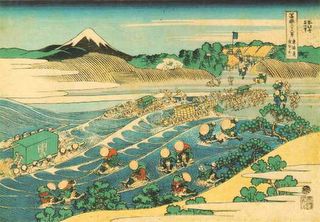
From Kanaya on the Tokaido road
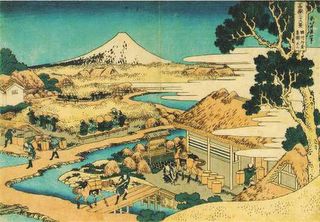
From the tea garden at Katakura in Suruga

The view at dawn in Kai
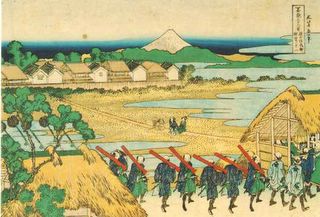
From Senju
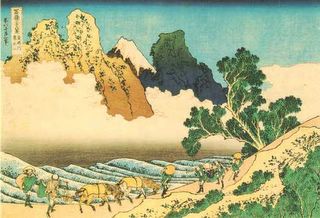
Ura Fuji viewed from the Minobu river

People climbing Mount Fuji

